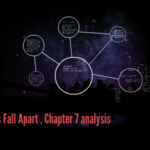Isi Nke Isii
Things Fall Apart. Albert Chinụalụmọgụ Achebe.
The Not-Yet-Born, The Joy of the Living, and The Contest of powers
Arịnzechukwu Ezeoke
Achebe takes us to ilo where we’ll gather to watch the wrestlers under the ancient ákpụ̄ ógwū (silk-cotton tree). It is common knowledge that the “spirits of good children lived in that tree waiting to be born.” Not only that women who desire children in our community gather under this tree to sit in hopes for healthy birth; the Perikomas (strong revered men) also wrestle under this mighty tree.
Our elders, including Okonkwo, will attend today’s wrestling match. Already, three men who are clearly “possessed by the spirit of the drum” are filling the air with energy through the seven drums. The elders are reminiscing the old days when they were at the center of the event while the competitors dance into the circle in show of power – “Ịmakwa ndị anyị bụ?” The young wrestlers set the scene with their oft quick run as we await ndị akpụ obi.
Well, this time, it’s Mmaduka’s day. He wows everyone with his expertise that even the elders who don’t show their emotions are clearly amazed. It’s break time, and as the frenzy subsides, we learn from Ekwefi that she’s still dumbfounded by Okonkwo’s recent death-threat and that Ezimma (now 10 y/o) has come to stay. Thanks to chi Ekwefi.
Then, we learn about Chielo – the priestess of Agbala, the Oracle of the Hills and the Caves. Just like the drummers who are known to be possessed by the spirit of the drums when they direct their audience’s heart beat, Chielo prophesies extraordinarily when possessed by the spirit of Agbala.
Achebe takes us back to the wrestling ground. The surrounding villages can hear the voice of the crowd when the back of a man touches ground. Last year, Okafọ na Ikezue ended the match in a stalemate. They couldn’t outpace each other. Today, the match is so fierce that the frantic rhythm of the drums has become the heartbeat of the people. Ikezue, in desperation, tried his hand with a nice move to fling Okafọ overhead — a sad miscalculation. Okafọ, like àmụmà Amadiora (Amadiora lightening), took Okafọ down. Now on the shoulders of his supporters, young women sing his praise and the readers are awed – our eyes are wide open as our mouths as we cherish the prowess of Okafọ.
Analysis
- Achebe sets the scene for the role of music in Igbo life. Perhaps, a foreshadow of the critical role of music in the hands of the missionaries. (Cf. “The drums were still beating, persistent and unchanging. Their sound was no longer a separate thing from the living village. It was like the pulsation of its heart. It throbbed in the air, in the sunshine, and even in the trees, and filled the village with excitement”).
- Achebe reminds us that concepts of duality don’t go too well in the pre-colonial Igbo mindset. All speak to each other as interrelated realities:
- The living dead, the living, & not-yet-born.
- The spirits of the drum & the spirit of Chielo.
- Reason & Revelation.
- Natural & Supernatural.
- Grace & Nature.
- Body & Spirit.
- Heaven & Earth.
- The music that speaks to the core of Nwoye’s being and the music ndị kọtma would use to lure his being into the Christian religion.
- I’m fascinated by Achebe’s attention to Igbo people’s response to feelings/emotions. It appears the ideas of masculinity, and to some extent feminity, are surrounded by the social construct that the more you express your “weak” emotions, the less manly/womanly you are. Okonkwo’s outbursts highlight that whatever is suppressed gets expressed. One who doesn’t manage their emotions would often express them uncontrollably, stifling and choking relationships.




